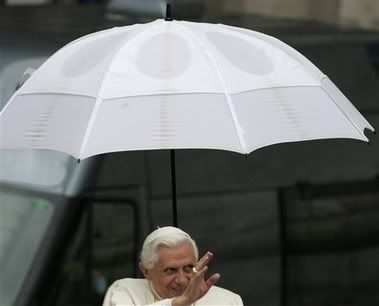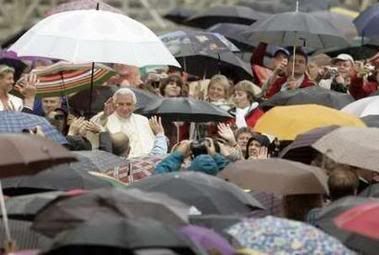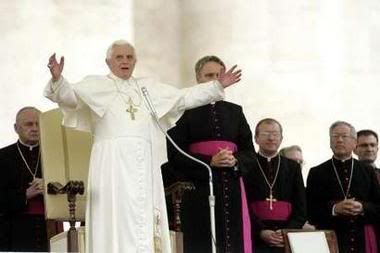
Thanks Again to the Ratzinger Forum for the quick translation and the pics from today Wednesday Audience. Here we go with the the weekly Wednesday Installment of the Pope Speaks!!! I think this one is very interesting because of what the Pope is hitting on. That is Christians and the whole wealth thing and what you are suppose to do with it. Also he is hitting on the relationships between Christianity and Politics. I think it is really Worth printing this one out. Not only for our own use in our Catholic faith but to give us a clue what the Pope has planned in some very anticipated documents coming up.
AUDIENCE OF 10/31/07Here is a translation of the Holy Father's catechesis at the General Audience at St. Peter's Square this morning.
Dear brothers and sisters! Between the end of the fourth century and the beginning of the fifth, another Father of the Church, after St. Ambrose of Milan, contributed decisively to the spread and consolidation of Christianity in northern Italy. He is St. Maximus, whom we meet as Bishop of Turin in 398, one year after the death of Ambrose. There is very little information about him. In recompense, a collection of about 90 sermons have come down to us.
From these emerges the profound and vital link of the Bishop to his city, which also attests an evident point of contact between the episcopal ministry of Ambrose and that of Maximus. At that time, serious tensions upset the normal order of civil coexistence. In this context, Maximus succeeded to consolidate the Christian population around him as pastor and teacher. The city was threatened by scattered groups of barbarians who, having entered through the eastern passes, were pushing towards the western Alps. Because of this, Turin was permanently protected by military garrisons, which became, during critical moments, a refuge for the people fleeing the countryside and unprotected urban centers . Maximus's interventions in the face of this situation bear witness to his commitment to do something about the civilian degradation and disaggregation.
Even if it is difficult to determine the social composition of the people that his Sermons addressed, it appears that his preaching - not risking generalities - was addressed specifically to a selected nucleus of the Christian community of Turin, consisting of rich landowners who had their possessions in the countryside and their homes in the city. It was a clear pastoral choice by the Bishop, who saw in this kind of preaching the most effective way to maintain and reinforce his own links to the people.

To illustrate Maximus's ministry in this perspective, I wish to refer, for example, to Sermons 17 and 18, dedicated to a theme that is always topical - that of wealth and poverty in the Christian communities. Because even in this field, serious tensions ran through the city.
Wealth was accumulated and hidden. "No one thinks of the needs of others," the Bishop said bitterly in Sermon 17. "Indeed, many Christians not only do not distribute from their own properties, but plunder those of others. I sayz: not only do they fail to lay down the money they take in 'at the feet of the apostles', but even drag away from the feet of the apostles their brothers who seek assistance."
He concludes: "Many guests and pilgrims come to our city. Do what you promised," adhering to the faith, "so that what was said of Ananias may not be said of you: 'You have not lied to men but to God.'" (Sermon 17, 2-3), In the next Sermon, the 18th, Maximus stigmatizes recurrent forms of looting and profiteering from the misfortunes of others. "Tell me, Christian," the Bishop asked his faithful," tell me: why have you taken the plunder abandoned by the plunderers? Why have you brought to your house any 'profit', as you may think of it, which was gained by force and contaminated?"
"Perhaps," he continued, "you thought you had 'bought' it, and thereby think you can avoid being accused of avarice. But this is not the way to establish a sale. It is alright to buy things which, in times of peace, are freely sold, but not to buy that which has been looted in plunder. ...Therefore, act like Christians and as citizens who buy back things in order to return them" (Sermon 18,3).

Maximus thereby was able to preach about the profound relation between the duties of a Christian and of a citizen. In his eyes, to live a Christian life meant taking on civic commitments as well. Vice-versa, every Christian who, "although he could live through his own labor, grabs someone else's loot with the fierceness of beasts"; who "undermines (lays a trap for) his neighbor, who every day tries to gnaw at his neighbor's boundaries, to take possession of his crops" is not only like a fox who beheads chickens but a wolf who preys on pigs" (Sermon 41,4). Compared to the prudent defensive attitude taken by Ambrose to justify his famous initiative of rescuing prisoners of war, the historical changes that have since taken place in the relations between a bishop and civic institutions emerge clearly.
Supported by a law which called on Christians to redeem prisoners of war, Maximus - with the collapse of the Roman empire's civilian authority - felt fully authorized to exercise a true and proper power of control over the city. This power would become broader and more effective to the point of substituting for the absence of magistrates and civic institutions.
In this context, Maximus did not only move to re-ignite among the faithful a traditional love for their native city, but proclaimed that it was their duty to take on fiscal responsibilities, as serious and unpleasant as they appeared to be (Sermon 26,.2). In short, the tone and substance of his Sermons assume a mature and growing consciousness of the political responsibility of a bishop in specific historical circumstances.

He was the 'lookout' for the city. Who should be these lookouts and guardians, he asks in Sermon 92, "if not the blessed bishops, who, being mounted, so to speak, on an elevated rock of wisdom for the defense of the people, see from afar the evils that are approaching?" In Sermon 89, the Bishop of Turin illustrates to the faithful his task, availing of a singular comparison between a bishop's function and that of bees: "Like the bee," he said, "(bishops) observe corporal chastity, offer the food of celestial life, use the sting of the law. They are pure in order to sanctify, gentle in order to restore, and severe in order to punish."
That is how St. Maximus described the mission of a bishop in his time. Ultimately, historical and literary analysis shows his growing awareness of the political responsibility that ecclesiastical authorities had, in a context when the latter was in fact substituting for absent civilian authority. This, in fact, was how the bishop's ministry developed in northern Italy, starting with Eusebius, who lived in his Vercelli like a monk, to Maximus, situated like a sentinel on the highest rock in the city. Obviously, the historical, cultural and social context today is profoundly different. The context today is that which my venerated predecessor, Pope John Paul II, described in his post-synodal exhortation Ecclesia in Europa, in which he offers a detailed analysis of the challenges and signs of hope for Europe today (6-22).
In any case, despite changed conditions, the duties of the believer towards his city and homeland remain valid. The interweaving of the commitment of the 'honest citizen' with that of the 'good Christian' has not grown less. In conclusion, I wish to recall what the Pastoral Constitution Gaudium et spes says to illuminate one of the most important aspects of the unity of Christian life: the consistency between faith and behavior, between Gospel and culture. The Council exhorts the faithful to "strive to discharge their earthly duties conscientiously and in response he Gospel spirit.
They are mistaken who, knowing that we have here no abiding city but seek one which is to come, think that they may therefore shirk their earthly responsibilities. For they are forgetting that by the faith itself they are more obliged than ever to measure up to these duties, each according to his proper vocation" (n. 43). Following the magisterium of St. Maximus and many other Fathers of the Church, let us make the Council's hope ours as well, that the faithful may ever more "exercise all their earthly activities and their humane, domestic, professional, social and technical enterprises by gathering them into one vital synthesis with religious values, under whose supreme direction all things are harmonized unto God's glory" (ibid), and therefore, to the good of mankind.
The following is the English synthesis of the catechesis and the Pope's greeting to English-speaking pilgrims:
In our catechesis on the Fathers of the Early Church, we now turn from Saint Eusebius of Vercelli and Saint Ambrose of Milan to another great Bishop of Northern Italy, Saint Maximus of Turin. We meet Maximus as Bishop of Turin in 398, a year after the death of Ambrose. It was a time of growing civil unrest, when Turin had become a centre of refuge for those fleeing before the barbarian invaders. His Homilies reflect a growing awareness of the responsibility of Christians to promote a just social order grounded in solidarity with the poor.
Addressed specifically to the wealthy, the Homilies inculcate concern for those in need, readiness to sacrifice for the common good and commitment to public service. Like many other Bishops of the time, Maximus found himself called upon to take on greater civic authority and responsibility. His example and teaching remind us that, whatever the age in which they live, Christian believers are called upon to carry out faithfully their duties as citizens, working to imbue temporal society with the spirit of the Gospel, and striving to achieve a vital synthesis between their duties as citizens of the earthly city and their commitment to work for the coming of God’s Kingdom of holiness, justice and peace.
I warmly greet the Sisters of the Resurrection present in Rome for the beatification of their foundress Mother Celine Chludjinska Borzencka. May the Lord grant them the grace of following generously in her footsteps. I also welcome the members of the Risso Kossei-kai Buddhist group from Japan. Upon all the English-speaking visitors, including those from England, Wales, Ireland, Australia, Denmark, Sweden, Canada, the Philippines and the United States, I invoke God’s abundant blessings.
No comments:
Post a Comment